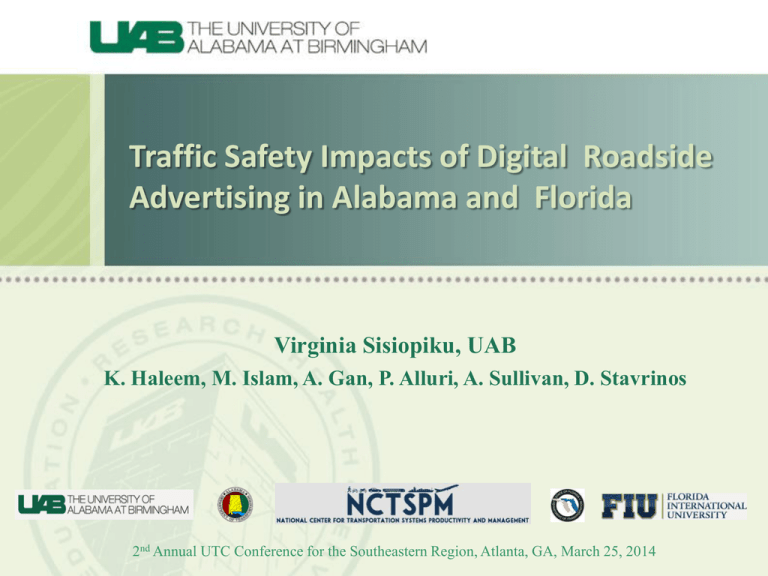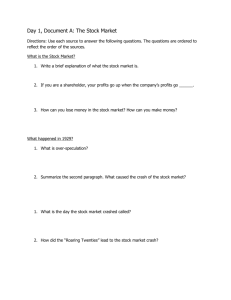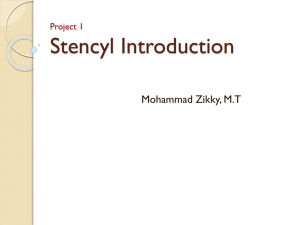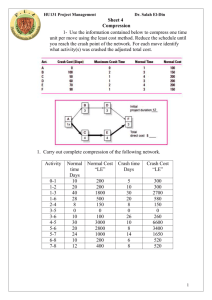Powerpoint Templates
advertisement

Traffic Safety Impacts of Digital Roadside Advertising in Alabama and Florida Virginia Sisiopiku, UAB K. Haleem, M. Islam, A. Gan, P. Alluri, A. Sullivan, D. Stavrinos 2nd Annual UTC Conference for the Southeastern Region, Atlanta, GA, March 25, 2014 RESEARCH SCOPE • Investigate links between Digital Advertising Billboards-Distraction-Traffic Safety Risk • Multi-state and multi-facet approach 1. 2. 3. 4. State-of-Practice-Synthesis Survey of Road Users Driving Simulator Study Epidemiological Study DIGITAL BILLBOARDS UNIQUE FEATURES • Brightness and contrast with surroundings • Messages changing suddenly • Realistic imagery • No acclimation with message • Potential for message sequencing • Potential for interactivity with driver 1. STATE-OF-PRACTICE SYNTHESIS Approach • Meta-analysis studies • Crash studies of historical trends • Laboratory studies • Naturalistic studies of driving behavior STATE-OF-PRACTICE SYNTHESIS Findings • Overall, the state-of-practice synthesis suggests that there is evidence of correlation between digital advertising billboards and increased driver distraction. • However, local conditions, experimental settings, and other factors may play a role in the actual impact that digital advertising billboards have on traffic safety 2. SURVEY OF ROAD USERS Approach - Goal: Survey of driver’s perceptions and attitudes toward digital advertising billboards - Demographics/Exposure - Perceived safety and efficiency - Regulations - Method: - Online - Response: - 295 AL; 340 FL SURVEY OF ROAD USERS Sample Findings- Alabama Drivers SURVEY OF ROAD USERS Sample Findings- Alabama Drivers SURVEY OF ROAD USERS Sample Findings- Alabama Drivers SURVEY OF ROAD USERS Findings Summary- Alabama Drivers • Road users perceive digital billboards as more dangerous than static • Younger drivers admit staring at digital billboards longer without adjusting their speeds • Responders overwhelmingly agree on the need for stricter regulations of billboards 3. DRIVING SIMULATION STUDY Approach • Goal: Evaluate the distractive effects of roadside billboards through the use of the UAB driving simulator • Approach: • Developed driving simulator data collection protocol • Developed driving simulator scenarios • 16 mile simulated highway driving scenario, with a mixture of digital and static billboards • Recruit participants (57) • Data collection and analysis DRIVING SIMULATION STUDY Analysis • Length of Eye Gaze Percent of time participants spent looking at billboards while driving • Memory Recall and Recognition Post-drive memory recall of information presented on billboards. • Driving Performance a) the number of speed limit exceedances, v>69 (mph) b) the number of road edge excursions, and c) the total number of motor vehicle collisions DRIVING SIMULATION STUDY Sample Findings • • Participants had fewer speed exceedances when there was a billboard present Teens, as expected, had more speed exceedances than middle aged and older drivers 3. CRASH ANALYSIS Approach • Goal: Analysis of historical crash records in the vicinity of digital billboards • Approach: • Identification of sites • AL: I-65; I-20/59, I-459; I-565; I-85; I-10 • FL: SR 826, SR 408, and SR 528. I-95, I-395, and I-4 • Methodology • Crash data analysis 4. CRASH ANALYSIS Sample Findings – Florida Sites Crash Summary Statistics at the FL Digital Billboard Locations Upstream Loc. City 1 2 3 4 5 Delray Beach Miami Doral Miami Miami Hallandale 6 Beach 7 Eatonville 8 Orlovista 9 Orlando 10 Tampa Total Crashes Len. (mi) Total Crash Count 0.23 0.39 0.40 0.20 0.19 1 13 21 15 97 0.28 0.40 0.36 0.40 0.40 3.25 Downstream Percent Change in Crash * Crash Rate Rate Crash Rate * Len. (mi) Total Crash Count 195,000 123,808 210,000 162,900 245,000 0.020 0.246 0.228 0.420 1.903 0.54 0.21 0.35 0.20 0.26 14 9 36 41 35 193,250 143,333 211,667 160,720 251,543 0.123 0.273 0.444 1.165 0.489 501.70 11.06 94.38 177.04 -74.32 54 232,389 0.758 0.24 15 238,253 0.240 -68.39 3 1 2 8 215 160,000 60,000 42,750 153,750 --- 0.043 0.042 0.107 0.119 0.404 0.40 0.17 0.17 0.34 2.88 3 2 0 7 162 151,500 60,000 --153,929 --- 0.045 0.179 0.000 0.122 0.304 5.61 323.53 -100.00 2.82 -24.79 AADT AADT • Mixed results • Overall, crash rates nearly 25% higher in the area of digital billboard influence (upstream) CRASH ANALYSIS Sample Findings – Florida Sites Summary Statistics at the FL Digital Billboard Locations by Crash Type Crash Type Rear-end Sideswipe Collision with Fixed Objects1 Median Crossover Tractor/Trailer Jackknifed Total Crashes Upstream Downstream Percent Change 2 2 Crash Count Crash Rate Crash Count Crash Rate in Crash Rate 82 88 43 1 1 215 0.187 0.173 0.111 0.021 0.014 0.404 99 40 21 2 0 162 0.186 0.094 0.049 0.032 0.000 0.304 -0.12 -45.74 -55.84 54.27 -100.00 -24.79 • Higher crash rates were observed for collisions with fixed objects and sideswipe in the area of digital billboard influence (upstream) STUDY CONTRIBUTIONS • Provides an objective multidimensional evaluation of the impact of digital billboards on safety • Raise awareness of safety issues related to digital billboard advertising • Update guidelines for regulation and placement of digital advertising billboards at the regional and national levels QUESTIONS AND COMMENTS


